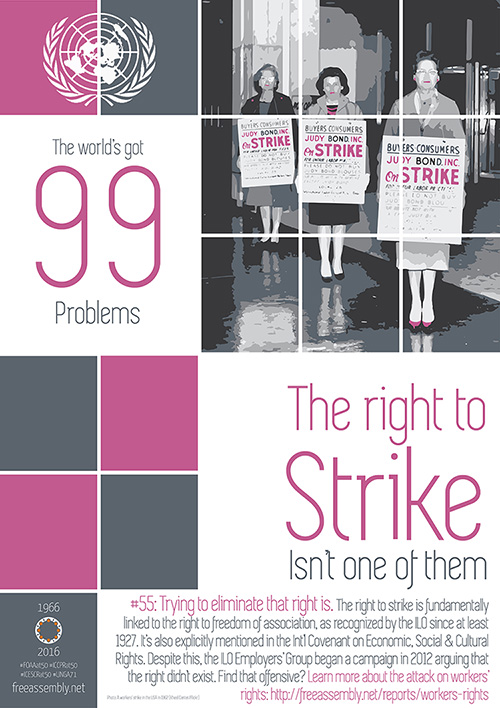 GENEVA – Further to the Human Rights Council side event on freedoms of association and of peaceful assembly in the workplace which took place on Monday 6 March, and on the occasion of a key meeting of the International Labour Organization (ILO), the UN Special Rapporteur on the rights to freedom of peaceful assembly and of association, Maina Kiai, is recalling that the right to strike is a fundamental one enshrined in international human rights and labour law, and that its protection is necessary in ensuring just, stable and democratic societies:
GENEVA – Further to the Human Rights Council side event on freedoms of association and of peaceful assembly in the workplace which took place on Monday 6 March, and on the occasion of a key meeting of the International Labour Organization (ILO), the UN Special Rapporteur on the rights to freedom of peaceful assembly and of association, Maina Kiai, is recalling that the right to strike is a fundamental one enshrined in international human rights and labour law, and that its protection is necessary in ensuring just, stable and democratic societies:
“As the 329th session of the Governing Body of the ILO starts today, I wish to reiterate the utmost importance of the right to strike in democratic societies.
As stated in my 2016 thematic report to the General Assembly (A/71/385), the right to strike has been established in international law for decades, in global and regional instruments, such as in the ILO Convention No. 87 (articles 3, 8 and 10), the International Covenant on Economic, Social and Cultural Rights (article 8), the International Covenant on Civil and Political Rights (article 22), the European Convention on Human Rights (article 11), and the American Convention on Human Rights (article 16). The right is also enshrined in the constitutions of at least 90 countries. The right to strike has in effect become customary international law.
The right to strike is also an intrinsic corollary of the fundamental right of freedom of association. It is crucial for millions of women and men around the world to assert collectively their rights in the workplace, including the right to just and favourable conditions of work, and to work in dignity and without fear of intimidation and persecution. Moreover, protest action in relation to government social and economic policy, and against negative corporate practices, forms part of the basic civil liberties whose respect is essential for the meaningful exercise of trade union rights. This right enables them to engage with companies and governments on a more equal footing, and Member States have a positive obligation to protect this right, and a negative obligation not to interfere with its exercise.
Moreover, protecting the right to strike is not simply about States fulfilling their legal obligations. It is also about them creating democratic and equitable societies that are sustainable in the long run. The concentration of power in one sector – whether in the hands of government or business – inevitably leads to the erosion of democracy, and an increase in inequalities and marginalization with all their attendant consequences. The right to strike is a check on this concentration of power.
I deplore the various attempts made to erode the right to strike at national and multilateral levels. In this regard, I welcome the positive role played by the ILO’s Government Group in upholding workers’ right to strike by recognizing that ‘without protecting a right to strike, freedom of association, in particular the right to organize activities for the purpose of promoting and protecting workers’ interests, cannot be fully realized.’
I urge all stakeholders to ensure that the right to strike be fully preserved and respected across the globe and in all arenas”, the expert concluded.

 Tweet
Tweet
 Facebook
(0)
Facebook
(0) 




